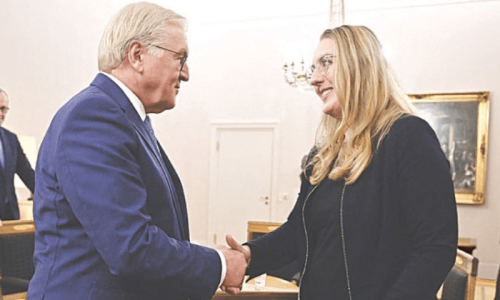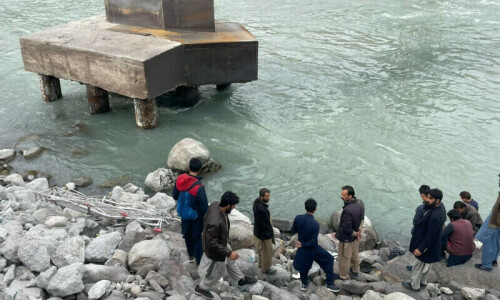 It was perhaps the most inauspicious day ever for the world’s political and economic elite to open their annual meet at Davos on Wednesday.
It was perhaps the most inauspicious day ever for the world’s political and economic elite to open their annual meet at Davos on Wednesday.
Already battered by the credit crunch stalking the US, the European and the Japanese money markets over the last six months, the situation plunged further down the line on Monday as stocks across the rich world tumbled like nine pins. In panic or perhaps because there was nothing much to do at this late hour the US Federal Reserve slashed interest rate out of its regular schedule for taking such decisions since 9/11 and with a 75 basis point cut. It was perhaps the largest decrease ever in the interest rate in the last 25 years.
The rate cut came after US President George W. Bush had announced on Friday stimulus package valued at $145 billion that showed how real the danger of a recession is. This was done perhaps to divert investors from bonds to stock markets creating a crisis in the bond market on the rebound.
The European banks, the Bank of England and the Japanese banks are waiting with baited breath before taking a decision as to how much of the interest rate to cut .
From one perspective it seems as if the Americans and the Europeans are paying for their financial profligacy over the last five years. Risk dispersal took place in a number of ways with some trying to pay no more than nothing for their high risk activities in the name of exotic and complex financial derivatives with the hedge funds, private equity funds and other such institutions skimming off millions without looking into the horse’s mouth.All this was being done in the name of deregulation of the world financial sector which it was thought would promote globalisation as investments floated across the world through what seemed like seamless borders.
On the first day of the Davos meet world economic leaders were split about whether the sharp downturn in the US economy, which provoked the US Federal Reserve into its biggest rate cut in quarter of a century, would drag the rest of the world down with it.
Money market wizard George Soros was quoted by media saying, that it would be "very difficult" to avoid recession in both the US and the UK, which would gradually shift economic power to the east, where countries like China would see their economies slow but not crash, he said.
Some believe that the onrushing bout of recession when it actually unfolds its wings could last for more than a year further deepening the financial crises causing the world stock markets and the banking sectors to get the beating of the decade.
 Joseph Stiglitz, the 2001 Nobel Prize winner for economics and a high profile anti- globalisation personality has rightly argued that the Fed was trying to solve a crisis of its own making. "What we have now are the foreseeable consequences of bad economic management," he said.
Joseph Stiglitz, the 2001 Nobel Prize winner for economics and a high profile anti- globalisation personality has rightly argued that the Fed was trying to solve a crisis of its own making. "What we have now are the foreseeable consequences of bad economic management," he said.
Some at the Davos were also arguing on the first day that interest cuts would not solve the problem, instead in their opinion a bubble economy would emerge which they think would cause further havoc across the world’s financial markets.
Arguing against this doom’s day scenario was former US Treasury Secretary John Snow who told delegates that his country tended to have short and shallow slowdowns, and this time would be no different given the Fed's rate cuts and President Bush's package of short-term tax cuts announced last week.
And David O'Reilly, chief executive of oil giant Chevron said he was optimistic. "The United States economy will correct itself. I'm an optimist when it comes to the length of what may be a slowdown or a mild recession ... the outlook is still pretty good."
It had all begun when mid-way through last year the banks found that their mortgage lending had gone beyond the collateral limits and the risk dispersal that they had managed with the help of hedge funds , private equities and other investment funds had finally come home as a zero-sum game. Many banks and financial institutions and investment banks had to resort of massive write-offs. And many top managers of top investment and banking institutions and CEOs had to go home for taking unnecessary risks.
Recession in the US and the European markets would mean a serious collapse in demand and consequently slashing of import orders which in turn is expected to further spread and deepen worldwide recession.
However, there is still hope among many independent economists that China and India would save the day by increasing what is called the inter-emerging market trade and also their domestic commercial activity as more Chinese and more Indian now have more expendable surpluses in their pockets.
British Prime Minister Gordon Brown has acknowledged that no country was immune from the global turbulence, but insisted that Labour had fashioned a British economy that was well placed to chart a course through it. This is borne out by the latest employment figures as the Guardian in its editorial on Wednesday put it that the everyday life of the people has not yet taken a blow.
Over the autumn there were more jobs, fewer people on benefits, and an increasing number of vacancies. But can all this be sustained? As Monday's public-finance figures underlined, the government is already running close to its self-imposed overdraft limit; and the support it is extending to Northern Rock is set to push it over the edge.
As a result of all this and battering that the US dollar has received over the last several weeks, it is believed that perhaps it was time for the world to look for a safer currency to keep its liquid wealth. Oil producers are already finding it difficult to finance their development activities at even $100 a barrel because the dollar’s purchasing power has declined considerably over the last one year.












































Dear visitor, the comments section is undergoing an overhaul and will return soon.